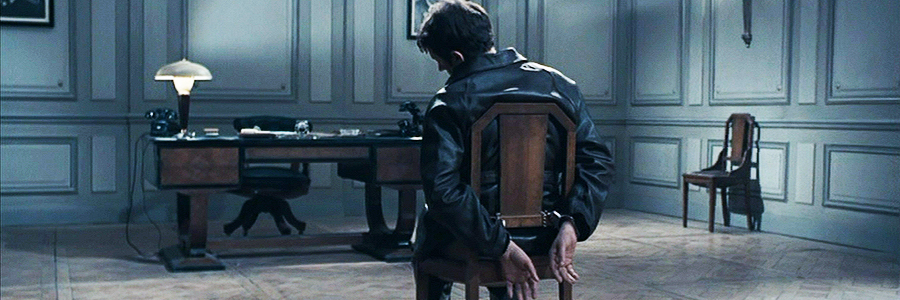
Army Of Shadows

ARMY OF SHADOWS (MOVIE)
Valoria Films
Original release: September 12th, 1969
Running time: 145 minutes
Country of origin: France
Original language: French with English subtitles
Writer and director : Jean-Pierre Melville
Cast: Lino Ventura, Simone Signoret, Jean-Pierre Cassel
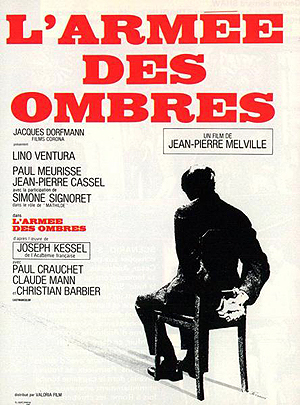
War movies often find themselves either trumpeting the heroics of valiant and/or adventurous soldiers or highlighting conflict’s ability to make monsters of us all. This might be especially true with tales of brave resistance fighters, who remain unbroken and undeterred despite conquest. In Jean-Pierre Melville’s depiction of the French resistance in WWII, Army Of Shadows, there’s no glorifying of these covert soldiers ongoing battle, but instead a restrained portrayal of the grey and murky world that they were forced to inhabit.
French writer Joseph Kessel wasted no time in putting pen to paper to document his experiences during the war in his novel which Melville used as a basis for the film. Both men had fought for the resistance and so we can be sure that they have both attempted to understand and come to terms with their struggles through this particular story.
Upon its initial release in 1969, Melville’s picture was a rather controversial one and received something of a critical mauling, particularly from Cahiers du Cinéma. This was largely due to the opinion that it was pro-Charles de Gaulle who was something of a persona non grata at the time. This meant that it didn’t receive wide distribution outside of France until around forty years later where it has generally been received with glowing recommendations.
After a shocking and bombastic opening that sees Nazi soldiers goose-stepping down the Champs-Élysées The plot follows Philippe Gerbier (Lino Ventura) who’s a leading agent of the French network. As the film opens he’s being incarcerated in a prison camp but is soon transferred to a Nazi headquarters in Paris. There he escapes and rejoins his comrades Félix (Paul Crauchet), Le Bison (Christian Barbier) and Le Masque (Claude Mann). Having singled out the traitor that was responsible for Gerbier’s arrest, they take the young man to an isolated house to kill him for his crime. Here we witness first hand the less heroic nature of the Resistance as the execution is half-bungled when they cannot use a gun due to the neighbours and the building’s thin walls. The whole affair leaves a bitter taste in the mouth and sets the tone for a far from triumphant picture.
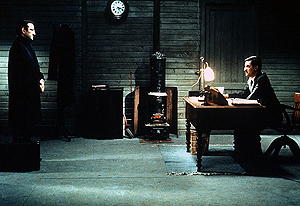
We’re introduced to various other members of the resistance including the wonderful Mathilde (Simone Signoret), the newly recruited Jean-François (Jean-Pierre Cassel) and – although neither realise they’re both fighting for the Resistance – his brother, Luc (Paul Meurisse). Through them all we come to understand the sacrifices that people had to make in order to serve, but also the crushing weight of secrecy and paranoia that each of them bears.
There’s a stand-out sequence in which Gerbier is once again detained, and led into the middle of a long thin bunker. At one end is a row of machine guns and at the other a wall. They’re told by the Nazi’s that anyone who makes it to the wall before being killed will be spared – until next time. It’s a cruel game to play with the desperation of condemned men and creates a palpable tension in us as to whether we want him to run or to proudly stand against the German bullets.
This a rare moment of overt action and drama in a film generally far more concerned 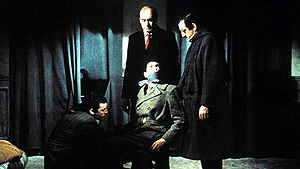 with the waiting game that must often be deployed in the fight. Melville’s film provides an unsentimental account of their lives as freedom fighters and the harsh reality of a world glamorised more often than not.
with the waiting game that must often be deployed in the fight. Melville’s film provides an unsentimental account of their lives as freedom fighters and the harsh reality of a world glamorised more often than not.
However, Army Of Shadows has been held up as a classic – Melville’s masterpiece – and whilst I think it’s a very good film I can’t quite agree with that high praise. The reason for this is that despite a range of different players in the story, none of them is really fleshed out enough for us to ultimately care about them personally. We’re naturally inclined to support the freedom fighter – especially in this particular scenario – but even Gerbier is not rounded out in such as way as we invest in him as a person rather than a soldier.
What this ultimately means is that the film provides a compelling and realist look at the dangerous world of the French Resistance. When the finale approaches though, and something that should be awful has to happen, we don’t quite feel the impact of it – on ourselves or the characters – in the way Melville and Kessel would have.
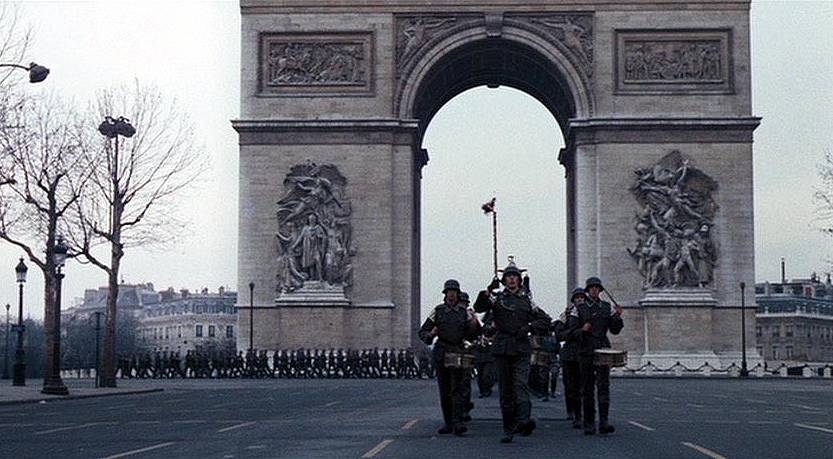

Ben Nicholson
Ben has had a keen love of moving images since his childhood but after leaving school he fell truly in love with films. His passion manifests itself in his consumption of movies (watching films from all around the globe and from any period of the medium’s history with equal gusto), the enjoyment he derives from reading, talking and writing about cinema and being behind the camera himself having completed his first co-directed short film in mid-2011.
His favourite films include things as diverse as The Third Man, In The Mood For Love, Badlands, 3 Iron, Casablanca, Ran and Grizzly Man to name but a few.
Ben has his own film site, ACHILLES AND THE TORTOISE, and you can follow him on Twitter @BRNicholson.
© 2022 STATIC MASS EMPORIUM . All Rights Reserved. Powered by METATEMPUS | creative.timeless.personal. | DISCLAIMER, TERMS & CONDITIONS
HOME | ABOUT | CONTACT | TWITTER | GOOGLE+ | FACEBOOK | TUMBLR | YOUTUBE | RSS FEED
CINEMA REVIEWS | BLU-RAY & DVD | THE EMPORIUM | DOCUMENTARIES | WORLD CINEMA | CULT MOVIES | INDIAN CINEMA | EARLY CINEMA
MOVIE CLASSICS | DECONSTRUCTING CINEMA | SOUNDTRACKS | INTERVIEWS | THE DIRECTOR’S CHAIR | JAPANESE CINEMA





